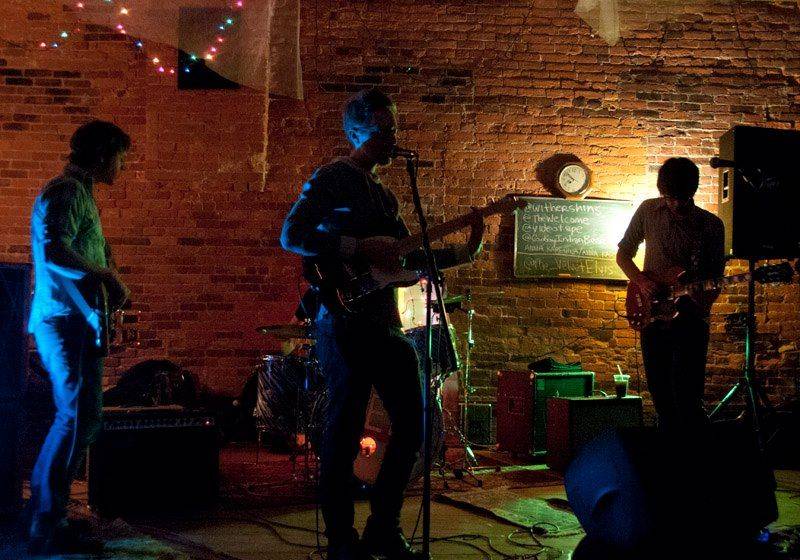There are bands, movies, restaurants, and books we all mean to give more attention. No matter what our supposed intentions, we somehow let opportunities slip through our fingers. We never eat at that new restaurant; the stack of best sellers goes untouched. Even the people we meet sometimes stay under the radar.
My husband and I met a great couple about two years ago. We liked them right away. They were funny, smart, and appreciated live music. We thought how great it would be to spend more time with them. The problem was, we were busy. They were busy. We all had full lives with a lot of activities and work. We never quite formed what you might call a friendship. Every encounter we had was comfortable, sharp witted, and completely unplanned. David and Katie were the Friends Who Got Away.
Turns out, the David Henson of David & Katie is also the musician from Shadows on the River who I interviewed this week. I had no idea he was the same guy until we were done talking and he sent me photos of the band. When people say this is a small town, they really have no idea.
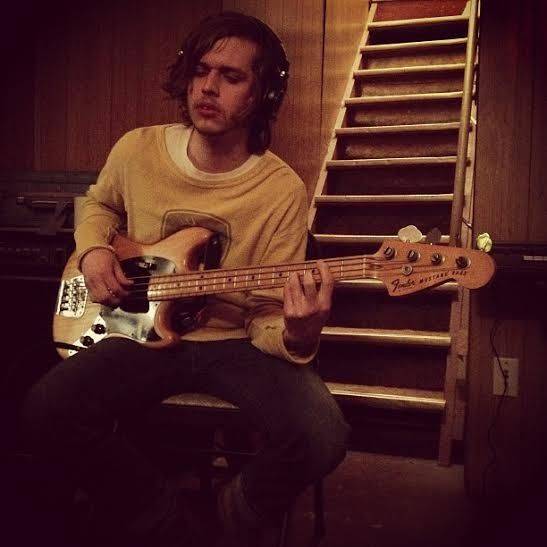
Cole Rabenort
Smile Politely: Where did the band name come from and how did you get started?
David Henson: Most of the guys that I currently play with I met in college when I transferred to Millikin University in Decatur, halfway through freshman year. Jordan Snow, our drummer, approached me after I played a solo show on campus and pretty much demanded we start playing together. Adam Klavohn (guitar) was a guy who sat behind me in the one semester of choir that the school made me take. I just had a strong feeling that I should ask him if he played an instrument and if he wanted to be in a band with me. A week or two later we were writing songs together. Jordan brought in Danny Hynds and our first bass player, Bill Myers. We originally played under the name The Infinity Room, but when Bill said he was joining the Peace Corps after playing together all through college, we took it as a sign and all decided to go our separate ways. Eventually, some of us ended up in Chicago and decided to start playing together again. Coincidentally, our friend Joey Lemon from the band Berry had moved to Chicago at the same time and was running a recording studio in his house, so we started recording with him and that turned into our self-titled debut album in 2009.
After college, I had decided I didn’t want to play any of The Infinity Room songs again, and I wanted to make a clean break from who I was when I was in college. I was in Chicago trying to learn how to be an adult and being poor and freaking out, feeling like I didn’t know how to run a band and be a kind and happy person at the same time. So I told myself that I was going to have a new name to play under and that it didn’t matter if no one else showed up to play with me, because the name would be mine and as long as I showed up, I could play the songs by myself. So I wanted a name that was therapeutic in some way and also reminded me of the impermanence of everything to keep me in perspective. (I was getting really into Thich Nhat Hahn and Zen Buddhism at this point.) I thought of two really impermanent things and combined them into a single image and that became the slightly awkward band name Shadows on a River.
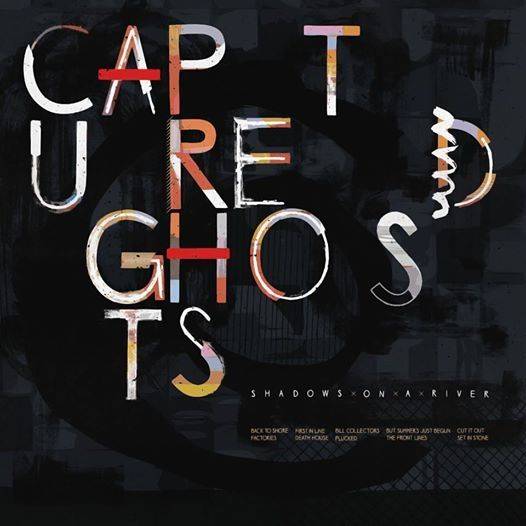
SP: “Slightly Awkward” is also a good band name…
How do you write music?
Henson: For this new record [artwork and new track, above], I wrote all of the songs by myself and then we arranged them as a band. We’ve been playing together long enough that we can get the basic skeleton of a song quickly. Then we record that and spend a long time throwing ideas at the wall to see what sticks. Most of the best sounds on the record were accidents that we tried to manipulate after the fact.
These days I write by trying to trick myself. A lot of songs were written very early in the morning before I could think about anything else. I would put a guitar in my hands or grab a keyboard and quickly -whatever the first thing that came out was- I would try to follow that through to the end, the end hopefully being a song. I try to work faster than I can think, so the best songs come out in less than 20 minutes and rarely get revised. I wrote around 40 songs that way and only ended up using a quarter of them.
SP: What inspires your music?
Henson: I never know how to talk about inspiration because I don’t know what a song is about until a long time after it’s written, if at all. I have rarely ever been able to sit and try to write about a specific thing. On the new album, there was one exception. For some reason I wrote a song called “Death House” that is about the old blues singer Son House’s “Death Letter Blues”, and my inability to understand or feel it fully even though I thoroughly love the mystery of it. It’s sort of chastising myself for being a white person writing about a poor black man’s pain. Why did I write a song chastising myself? What is the purpose of that? I don’t know but I probably deserve it. It’s also about people hearing a song like that before they’re ready for it, or from a music business perspective and just discounting it right away.
Son House and all those early blues guys got a raw deal. They all worked as janitors and stuff most of their lives, even though their songs lasted until today and are some of the biggest influences on the juggernaut that is the modern music industry.
But in general, I think my main inspiration is music itself and its ability to express things in a way no other medium can. It sounds backwards or shortsighted or like a snake eating its tail, but what I found is that, for someone who had a hard time expressing how strongly he felt things to other people, music was like a pressure valve that I could release a song at a time.
Maybe I should say that the inspiration was alienation, the alienation from our own lives that we recognize sometime around when we turn teenagers and wonder why we were born into such a cruel and impossible-to-understand world. Music becomes the raging against that. And then as I got a little older, it became closer to trying to love that paradox, if that makes sense. It takes a certain kind of mystery to fight another mystery.
SP: How did that play into creating this new album?
Henson: I also realized after the album was finished that most of the songs were sort of about childhood, or about adulthood as viewed through the eyes of a child. Maybe that’s because music will always be most meaningful to my younger self, when I needed it most. Or maybe that’s what all songs need [in order] to make sense: a more naive understanding of the world and the willingness to explore what can so easily be taken for granted.
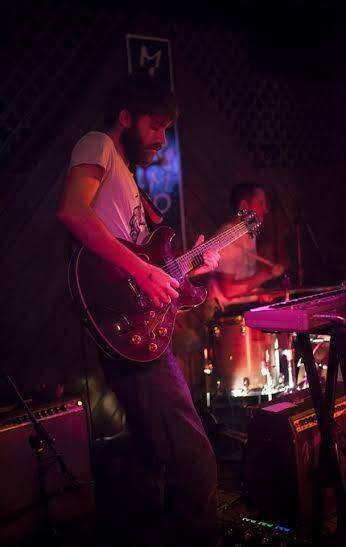
Danny Hynds (foreground), jordan Snow (drums)
SP: Adulthood viewed through the eyes of a child… confusing and overwhelming, from what I can gather.
Henson: Yeah, confusing and overwhelming sounds right.
SP: Where do you write? Is it a special space or is it flexible?
Henson: I wrote the first batch of songs in a tall apartment building in China with paper-thin walls around Chinese New Year. You could hear firecrackers going off in the background of the demos like I was recording in a war zone. I wrote the second batch in a hundred year old hotel in Laramie, Wyoming. You could hear the engines of passing motorcycle gangs in those demos. And I wrote the last batch in my unfinished basement in Champaign, where you can hear crickets and drops of water and the clicks of dog nails on linoleum above me.
SP: So you don’t write in a vacuum, it seems.
Who do you write for? Is there an audience or do you just write and tweak whatever comes out?
Henson: I think it’s probably more selfish… although I do often think about what my 16-year-old self would have thought of the songs I’m making now, and whether or not other kids that age -the kids who really devour and need music- would have any use for it. I’m trying to be less selfish in the way that I create things, but I don’t know if I’m succeeding. It’s more just an insatiable need to pull something from nothing and polish it until it shines.
SP: Yes. YES.
What’s your relationship with your bandmates? Do you hang out a lot or do you just create?
Henson: In college most of us lived together and our lives were pretty intertwined. Maybe too intertwined and that’s why we had to take a break for a bit. But we’ve been hanging out and making noise since we were still kids, basically, and have somehow kept getting together through moves and marriages and now a baby. Jordan Snow (drums) and Danny (guitars and keyboards) live in Chicago so I don’t see them as much as I’d like to. Cole Rabenort (bass) lives far away in Urbana and is pretty busy with his other band, The Fights, but I still get to see him once in a while. Adam Klavohn (guitar) is my neighbor and we work together, and I spend a lot of time with him, and he’s been the biggest reason the songs don’t fall flat on their faces when I record them. The rest of the guys have followed me down so many paths and indulged my half-cocked ideas and suggested their own ideas, and I will miss them dearly when I move to Nebraska this summer.
SP: Why are you going to Nebraska?
Henson: Katie is getting her PhD at UNL.
SP: Who’s Katie and why are you going to Nebraska with her?
Henson: Oh, sorry. My wife, the poet Katie Schmid, will be pursuing a PhD in Creative Writing starting this Fall at the University of Nebraska in Lincoln. We both applied to a handful of schools this year and decided we would go wherever we got the best offer. I’m sad to leave to leave my friends and bandmates, but I feel like finishing the album closed another chapter of whatever it is I’m doing in life, and I’m ready to see what’s next. I’ve found that the best experiences seem to come from sometimes letting things be decided for you so you can’t predict and manipulate what you think is coming next.
I don’t know what the band will look like going forward. I’ll probably play a lot of solo shows, or maybe I’ll build some robots to play drums and saxophone with me. I have a feeling that rock n roll might just up and die in the next few years, so I might need to adjust my plans accordingly. Maybe I can get an apprenticeship with Skrillex.
I hope I get to make another record with these guys again someday.
SP: Me, too! Well, it was great talking to you. Thanks for your time.
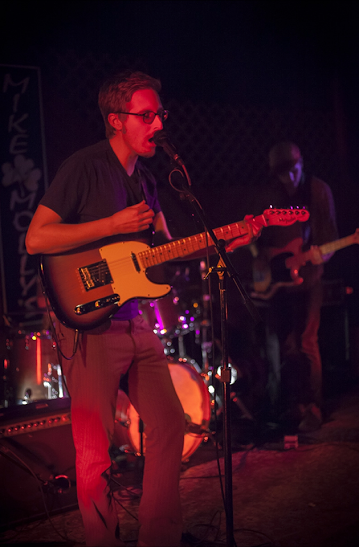
David Henson
SP: I just realized who you are! Hi, David! I thought you were just a different David Henson!
Henson: I was wondering why this email thread seemed so formal.
SP: Oh geeze!
Henson: There is only one David Henson! Actually, there are a lot.
SP: There are. There are a lot of them.
What a weird, wonderful discovery for a lady who conducts 3 or 4 interviews at a time, never scrutinizing all the Daves she comes across…
See Shadows on a River at Mike ‘N Molly’s at 8 p.m. tonight, July 3rd, with Secondary Modern and Emily Otnes & The Weekdays.
Top photo by Eric Frahm. “The dark works well for us.”








